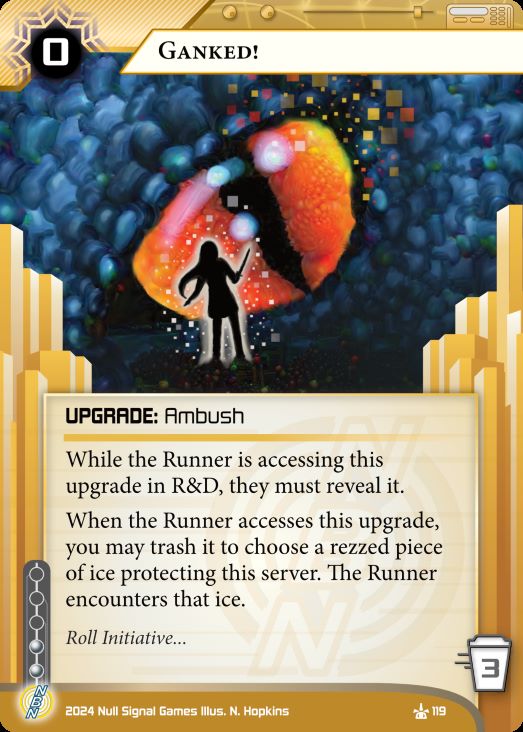Hello! Rubenpieters from the Rules team here to share some exciting rules news! The remastered editions of the Ashes Cycle are available to print-and-play starting today, and we have two rules changes to talk about, each related to a different Ashes card.
First, we are making a slight change in the candidate system, removing the possibility of infinite loops with Ganked! Second, we are beginning the process of reforming the ‘No Change In Game State’ (NCIGS) rules, exemplified by the remastered version of Rejig.
Today’s Comprehensive Rules release also contains a few other non-functional clarifications. There is also a small Card Text Updates release with four new entries relating to the NCIGS change, discussed in more detail below. You can find both documents at the Comprehensive Rules Hub.
Candidates rules change
With the System Gateway rules update, we introduced the ‘breach’ terminology and overhauled the rules for accessing cards. These changes were aimed at simplifying and streamlining some of the strange cases that could arise under the previous ruleset. However, the new rules also introduced the possibility of endlessly reinstalling Ganked! when the Runner is unable to break a Drafter or Ansel 1.0. This loop is most egregious with Ansel, which allows the Corp to trash the Runner’s entire board.
We’ve gotten a lot of feedback that this interaction is a strange gotcha for players unfamiliar with it. We’ve also encountered a bit of friction with this rule when exploring design space for future sets. With the reprinting of Ganked! in the Ashes remasters, we’ve decided it’s the right time to make a change.
We are making an amendment to the candidate rules which changes the way cards installed or moved into the root of a server are handled. As before, all cards that started a breach installed in the root of the breached server must still be accessed. But now, the Runner decides whether they want to access any cards that enter the root after the breach is underway. The Runner declares whether a new card becomes a candidate for access during the next checkpoint after the relevant card movement. If the Runner chooses to access the new card, they do not have to make it the next card they access if other candidates are still available.

There are no changes to the rules for candidates in HQ, R&D, or Archives. Notably, that means there are no changes to any interactions with Bacterial Programming.
Let’s look at a couple of examples of what is and is not affected by the new rule. Suppose the Corp is playing Ob Superheavy Logistics and uses Ganked! to create a mid-breach encounter with Anvil. They trash a card with rez cost 1 and use Ob to search R&D for an Urtica Cipher, installing it in the root of the server being breached. Since the same instruction that installs Urtica Cipher also rezzes it, the Runner will know that the new card is an ambush, and will be able to choose not to access it. If instead the Corp installs and rezzes Spin Doctor this way, the Runner will choose whether or not it becomes a candidate before the Corp draws 2 cards from its “when rezzed” ability.
Note that the Runner does not get this choice in scenarios where the contents of the server change before the breach. If the Corp uses Ob Superheavy Logistics and Reconstruction Contract to install an Urtica Cipher just before the Runner approaches the root of an iced server, then the Runner will have to access that Urtica Cipher. The new card in the root was installed before the breach began, so once the breach begins it becomes a mandatory candidate to access.
Getting started on removing NCIGS
‘NCIGS’ stands for ‘No Change in Game State’ and refers to rule 1.2.5 of the Comprehensive Rules. This rule says that players can’t trigger an ability that won’t do anything, for a particular value of ‘not doing anything’ that looks only at the direct effects of an ability, not at the costs paid to use it. NCIGS dates back to the FFG era of Netrunner, where it served as a catch-all way to prevent nonsensical or unintended interactions. But what counts as a change in game state for this rule is itself pretty unintuitive.
Other rules changes over the years, such as the interrupt system introduced alongside the original release of Uprising, have gradually been taking on the burden of coherence that NCIGS originally had to shoulder on its own. The Rules team intends to continue shifting that burden onto more robust structures until we can get rid of the catch all NCIGS rule altogether. We’re not there quite yet, but we’re ready to take a significant step in that direction.
That step is to remove NCIGS’s special jurisdiction over events and operations. Previously, the basic action to play an event or operation could not be taken when the card you want to play does not itself have “potential to change the game state”. Going forward, you just need to be able to play the card. The rules do not need to take a deeper look into what its effects might or might not do.
What exactly is changing?
If you carefully read the NCIGS rule as it is written, you may notice that there’s nothing in it specifically addressing events and operations. Neither is there any reference to NCIGS in the rules about playing an event or operation. So, what is actually changing in the Comprehensive Rules to accomplish this shift? Nothing. Yes, you heard me right. The text of the Comprehensive Rules themselves won’t actually change to accommodate this adjustment. You might wonder: how can the rules ‘change’ without the Comprehensive Rules changing?
It turns out that the long standing notion of how NCIGS works with events and operations is only supported by rulings on specific cards. It has never been explicitly laid out as a principle in rules documents, but comes from interpreting the description of “potential to change the game state” that various incarnations of the NCIGS rule have had over time.
What distinguishes this part of NCIGS from other parts is that ‘deeper look’. When you play an event, the ability you are triggering is the one on the basic action card: “: Play 1 event from your grip.“ NCIGS doesn’t care about the click we spend, but if we simply evaluate the impact of the following instruction, it’s pretty straightforward: you pay a play cost, a card moves from your grip to the play area, and then later that card moves to your heap. Those are all effects that would be game state changes in other contexts! There’s only a question of whether NCIGS could apply if we ignore those effects the same way we ignored the click cost. So, the rules change we are making is merely that we’re no longer going to give undocumented special treatment to ignore these inherent effects of playing a card. We will work on removing existing rulings on NetrunnerDB that conflict with this new interpretation.
Impact
What does all this have to do with the Ashes Cycle? Well, Downfall and Uprising each contain a card that follows in the footsteps of a much older card: Scavenge. Scavenge was originally printed even before NCIGS was clearly established, and was written using an additional cost in a way that didn’t play well with it. Specifically, since NCIGS ignored the additional cost, the Runner couldn’t simply trash and reinstall a single card unless some other card was present as a potential target for the install effect. Some time after NCIGS was codified, Scavenge received errata to eliminate this unintuitive behavior, changing the additional cost to play the event into something that happens while resolving it.
Rejig works in a very similar way to Scavenge, and in looking at wording updates for the remaster, we felt that the “additional cost to play” structure from Scavenge’s original wording was a much more natural way to write the card. This NCIGS change was a step we were considering anyway, so we decided to finish up our research and figure out if we had any reason not to change the ruling.
It turns out that the only cards where we found that this change would create a significant gameplay impact are Wake Up Call, Threat Assessment, and Hangeki. These operations are clearly only intended to be played if an installed card exists to give the Runner a meaningful choice. If the Runner does not have anything eligible to trash, the Corp should not be allowed to play Wake Up Call to just do 4 meat damage. Three cards is a pretty minimal amount of overhead, so we decided to go forward with the NCIGS change and issue text updates to maintain the intended functionality of these cards.
Finally, we need to address the other Scavenge-like card in Ashes: Simulchip. This card has the same problem that Scavenge used to have before its old errata. Unfortunately, we haven’t fixed this yet. The role of NCIGS in moderating the use of paid abilities is more subtle than what’s going on with events and operations, and we need more time to make sure we aren’t going to break things when we finally get rid of it.
Summary
In summary, we are making two noteworthy rules changes for the Ashes remaster:
- Corps can no longer create infinite Ganked! loops, because the Runner can now decline to access a Ganked! (or any other card) that gets installed in the middle of a breach.
- As a step towards removing the NCIGS rule, an ability that plays an event or operation no longer needs to look inside the effects of that event or operation for the player to be able to trigger it.
As always, we’re happy to hear your comments and help with your rules questions. You can reach the Rules team by email at rules@nullsignal.games, on our social media account @Netrunner_Rules@peoplemaking.games, or wherever else you happen to find us.

